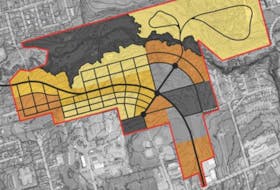During the peak of COVID-19, many employees were required to work at home because of business or workplace closures. This idea of working from home may become more commonplace as businesses navigate the state of the world.
Come April 2021, the fact that an employee worked from home for a period of time could have implications on one’s tax return.
According to Richard May, executive director of the Community Business Development Corporation (CBDC) in the Nortip office based in the Great Northern Peninsula, N.L., employees may be able to claim a portion of their house as a home office for tax purposes.
This calculation, he says, is based on the square footage of the space you are using as a percentage of the whole liveable space in the home.
Doug MacKay, a tax expert in Brackley, P.E.I., explains further. He says according to the Canada Revenue Agency (CRA), the office must have an appearance of an office. It must be a room set aside solely for business use and not part of another room that is also used for personal use. So, for example, the dining room table wouldn’t be eligible.
To make the calculation, MacKay says to then take the area of the office and divide it by the area of the home and that would give you a percentage to claim for tax purposes.
May and MacKay both say a portion of home bills, such as Internet, communications, mortgage interest, property tax, and utilities (heat and lights), insurance can be claimed as an expense. Based on his experience, MacKay says the percentage eligible to be claimed could be anywhere from five per cent to 12 per cent.
Other expenses, says MacKay, which would be 100 per cent deductible would include items like office supplies and business liability insurance.
Another point to note, says May, is that if an employer provided benefits to enable an employee to work from home, those payments may be taxable as income. If so, he says this income benefit can be offset by the expense of working from home.
For these expenditures to be claimed, however, May says that employees would need a letter from their employer indicating that they had to work from home and use their own resources to do so.
A reminder as well that the Canada Emergency Revenue Benefit (CERB) is also taxable income. According to the CRA, you will receive a T4A tax slip on the amount of CERB you receive. If you repay the CERB, the CRA won’t issue a T4A for that payment. To ensure that they don’t issue slips improperly, you need to repay any necessary CERB payments before December 31, 2020, as per the instructions on the CRA website.
To make expense claims, employees need to save receipts and have the appropriate information on hand, says May. This includes the bills for utilities, municipal taxes, insurance, receipts to show cost of supplies, and a recording of mileage to claim how many kilometers traveled to get supplies.
Carrie Jones, and accountant with TC Jones Chartered Professional Accountants based in Coldbrook, N.S., has lots of advice when it comes to organizing the information you will need when it comes time to do your taxes.
Filling one’s taxes is like a big puzzle, and many pieces are needed, says Jones, and it will be a lot easier and less stressful if those pieces are in place.
“Your best return and your best package will come if you have all the right information,” she says.
When storing information for tax time, Jones says the system does not need to be complicated. Although some people like file boxes or a labeling system, she says, people just need a place to put things. So, Jones recommends people use large Ziplock bags, labeled with the year. When cleaning up, any receipts or bills found that are relevant to employment, they can be added to that year’s bag.
If you are not sure if you need a particular receipt or not, Jones says to keep it anyway.
Using this system means that employees do not need to keep a running spreadsheet of expenses, but can tally them all at the end, if all the receipts are kept together.
If there is an easy place to keep them, you won’t lose important receipts, and it makes tax time easier. If the system is too complicated, or too detailed, you aren’t going to follow through with it, and may miss out on potential tax claims.
When it comes to tracking mileage for business on your personal car, Jones says to keep a notebook in the car to log either the exact mileage used, or a note of where you went, why and when, and later check the distance through Google maps.
There are a few ways mileage can be used as a deductible, through a per kilometre rate, or looking at the car mileage at the beginning of the year and the end of the year, and seeing what proportion was used for business, and therefore what per centage of car expenses can be claimed, says Jones.
Forms to keep you organized and keep track of information for tax time are available to download for free on the TC Jones website.
When it comes time to file taxes next year, the CRA will have been sure to have made several updates to what can be claimed and what counts as a deductible. May highly recommends using an accountant to help you navigate through the muddy waters so you can have your best return.









